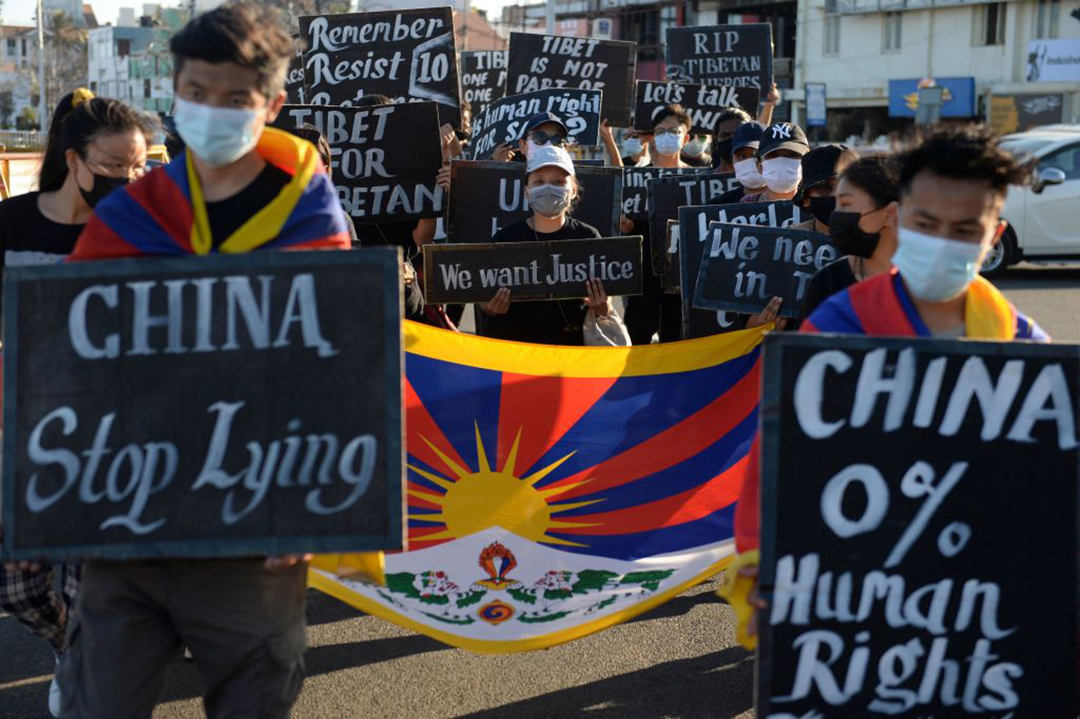Tibetans reject CCP’s propaganda over occupation of homeland

Exiled Tibetans and human rights groups are dismissing as nonsense the Chinese Communist Party’s (CCP’s) blatant rewriting of history surrounding its invasion and 70-year occupation of Tibet.
Ahead of the anniversary of the May 23, 1951, agreement that paved the way for the CCP’s takeover of the independent nation — a deal that experts contend was forced upon Tibet — the Chinese government released a white paper portraying the annexation as a “peaceful liberation.”
The white paper claimed that Tibet has seen an “enormous transformation” and it blamed “Western anti-China forces” for stirring unrest there, the state-run China Global Television Network reported.
“However, the truth, as evidenced by the situation in Tibet today, is that China violated its own forced agreement rather than implementing it,” the International Campaign for Tibet (ICT) said in a May 21 statement.
The Washington, D.C.-based nonprofit and other activist groups rejected the white paper as simply more propaganda in the CCP’s long campaign to erase Tibet’s rich past while exploiting its natural resources and strategic location. The mountain nation borders Bhutan, Burma, India and Nepal and is the source of many of the Indo-Pacific’s major rivers.
“In the seven decades since the agreement, the Chinese government has unilaterally instituted increasingly hardline policies that undermine Tibetan culture and religion [and] deny freedom of expression to the Tibetan people,” the ICT said. (Pictured: Tibetan Student Association members condemn China’s occupation of Tibet during a March 2021 protest in Chennai, India.)
After the People’s Liberation Army (PLA) invaded their nation, Tibetan representatives were coerced under the threat of violence into signing the 17-Point Agreement, a document that marks a “grim occasion in the history of Tibet,” the Central Tibetan Administration, the Dharamshala, India-based government in exile, said in a May 23, 2021, statement.
Among other provisions, the agreement purported to give the Tibetan people the right to exercise “national regional autonomy” and promised not to alter the existing political system, including the “established status, functions and power” of the Dalai Lama, the nation’s spiritual leader. Tibetans also were told that their religious beliefs and customs would be respected.
“China later showed no inclination to honor its own part of the agreement,” Jigme Yeshe, an assistant professor in the University of Calcutta’s Department of Political Studies, told Radio Free Asia in May 2021. “They immediately set out to inflict unbelievable atrocities upon the Tibetan people in order to hasten their occupation of Tibet and destruction of Tibet’s unique identity.”
Following a 1959 uprising against the occupying PLA forces, thousands of Tibetans fled to safety, including the Dalai Lama, who immediately renounced the 17-point agreement after arriving in India, where he remains in exile.
The CCP’s forced assimilation of ethnic Tibetans, who account for more than 90% of Tibet’s estimated population of 3.2 million, has included arbitrary detention, surveillance and torture, according to human rights organizations. Party officials have closed monasteries, punished dissenters and suppressed the teaching of the Tibetan language.
The repression mirrors the CCP’s crackdowns on other ethnic minorities, including in Xinjiang and Inner Mongolia, and has drawn worldwide condemnation. In February 2021, the European Union’s foreign policy chief, Josep Borrell, called on China to give United Nations human rights officials access to investigate alleged mistreatment of Tibetans, Reuters reported.
The Central Tibetan Administration’s newly elected president has said one of his priorities is to revive talks with China over Tibet’s autonomy.
“We will explore all possible means to find a lasting solution to the Tibetan issue,” Penpa Tsering said in early June 2021, the Tibet Sun news website reported. “But, in the meantime, we will expose all the wrong policies that’s troubling the people and the environment in Tibet.”
IMAGE CREDIT: AFP/GETTY IMAGES




